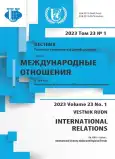Гендерная перспектива в полицейском миротворчестве ООН
- Авторы: Тишков С.А.1, Харичкин И.К.2
-
Учреждения:
- Орловский юридический институт МВД России имени В.В. Лукьянова
- Московский государственный лингвистический университет
- Выпуск: Том 23, № 1 (2023): Международная безопасность: глобальные и региональные тренды
- Страницы: 7-19
- Раздел: ТЕМАТИЧЕСКОЕ ДОСЬЕ
- URL: https://journal-vniispk.ru/2313-0660/article/view/320491
- DOI: https://doi.org/10.22363/2313-0660-2023-23-1-7-19
- EDN: https://elibrary.ru/UORIFR
- ID: 320491
Цитировать
Аннотация
Несмотря на всплеск конфликтов на рубеже XX-XXI вв. и активизацию миротворческой деятельности, участие женщин в миротворческих операциях было скорее исключением из правил, нежели стандартной практикой. Вместе с тем в фокусе внимания Организации Объединенных Наций (ООН) оказались проблемы негативного и непропорционального воздействия внутренних вооруженных конфликтов на женщин и детей. На протяжении последних двух десятилетий ООН работает над внедрением гендерной перспективы в архитектуру миротворчества. Отправной точкой стала принятая Советом Безопасности ООН (СБ ООН) в 2000 г. резолюция 1325, признававшая важность гендерной перспективы в вопросах мира и безопасности. Дальнейшие планомерные действия ООН в этом направлении позволили изменить представление о женщинах как о беспомощных жертвах вооруженных конфликтов и признать их активными акторами в деле укрепления мира и безопасности. Цель исследования - осветить текущее состояние выполнения обязательств международного сообщества в отношении женщин в контексте повестки мира и безопасности для восполнения образовавшихся теоретических лакун и обозначения дальнейших путей повышения роли женщин в качестве агентов мира и безопасности. Авторы использовали междисциплинарный, исторический и структурно-функциональный подходы, провели контент-анализ официальных документов и данных ООН, а также аналитических докладов международных организаций, ознакомились с актуальными научными трудами отечественных и зарубежных ученых. Полученные результаты подтверждают гипотезу о том, что принятие резолюции СБ ООН 1325 (2000) позволило изменить миротворческие практики ООН в контексте широкомасштабной повестки дня «Женщины, мир и безопасность» и сформировать новые подходы к участию женщин на всех стадиях мирных процессов. Активное и равноправное участие женщин в мирных переговорах и реализации политических решений стало важным фактором укрепления мира и безопасности. Однако текущая деятельность ООН не ограничивается участием женщин в миротворчестве. Помимо изменений в планировании и комплектовании миротворческих операций ООН работает над решением менее афишируемых поведенческих проблем, включая предотвращение сексуального и гендерного насилия, а также повышение профессиональных навыков миротворческого персонала. Вместе с тем увеличение численности женщин в военных и полицейских миссиях ООН вызывает некоторую озабоченность международного сообщества по поводу потенциальной маскулинизации женщин-миротворцев.
Ключевые слова
Об авторах
Сергей Александрович Тишков
Орловский юридический институт МВД России имени В.В. Лукьянова
Автор, ответственный за переписку.
Email: stishkov@list.ru
ORCID iD: 0000-0003-0406-0900
кандидат политических наук, доцент, заместитель начальника кафедры криминалистики и предварительного расследования в органах внутренних дел
Орел, Российская ФедерацияИгорь Константинович Харичкин
Московский государственный лингвистический университет
Email: igorkharichkin@yandex.ru
ORCID iD: 0000-0003-4478-0865
доктор философских наук, профессор кафедры политологии Института международных отношений и социально-политических наук
Москва, Российская ФедерацияСписок литературы
- Alchin, A., Gouws, A., & Heinecken, L. (2018). Making a difference in peacekeeping operations: Voices of South African women peacekeepers. African Security Review, 27(1), 1-19. https://doi.org/10.1080/10246029.2017.1406381
- Alexeiciuc, S.-D. (2020). Gender analysis of conflicts and conflict resolution. BENEFICIUM, (2), 58-65. http://doi.org/10.34680/BENEFICIUM.2020.2(35).58-65
- Arystanbekova, A. K., & Nurelbaeva, A. S. (2017). The women in the UN peacekeeping operations. Problemy Sovremennoi Nauki i Obrazovaniya, (22), 110-114. (In Russian).
- Arzieva, A. K. (2014). Development of recommendations on the formation of a peacekeeping groups of women. Nauka i Novye Tekhnologii, (2), 141-144. (In Russian).
- Bokeriya, S. A. (2017). Human security concept in the UN practice. Vestnik RUDN. International Relations, 17(2), 312-324. (In Russian). https://doi.org/10.22363/2313-0660-2017-17-2-312-324
- Bondar, E. O., & Shurukhnova, D. N. (2019). Participation of employee of the internal affairs bodies in peace-making efforts of the United Nations Organization within the context of gender equality. Administrativnoe Pravo i Protsess, (6), 45-48. (In Russian).
- Bridges, D., & Horsfall, D. (2009). Increasing operational effectiveness in UN peacekeeping: Toward a gender-balanced force. Armed Forces & Society, 36(1), 120-130. https://doi.org/10.1177/0095327X08327818
- Caparini, М., Aubyn, F. K., Davies, O. V., et al. (2015). Peace officers: The role of police in UNAMID. Institute for Security Studies Monograph, (190), 1-47. Retrieved from https://issafrica.s3.amazonaws.com/site/uploads/Mono190.pdf
- Karim, S., & Beardsley, K. (2013). Female peacekeepers and gender balancing: Token gestures or informed policymaking? International Interactions, 39(4), 461-488. https://doi.org/10.1080/03050629.2013.805131
- Khudaykulova, A. V. (2010). “Human security”: Concept, political discourse, and ways of implementation. MGIMO Review of International Relations, 6(15), 175-180. (In Russian).
- Krause, J., Krause, W., & Bränfors, P. (2018). Women’s participation in peace negotiations and the durability of peace. International Interactions, 44(6), 985-1016. https://doi.org/10.1080/03050629.2018.1492386
- Kreft, A. K. (2017). The gender mainstreaming gap: Security Council resolution 1325 and UN peacekeeping mandates. International Peacekeeping, 24(1), 132-158. https://doi.org/10.1080/13533312.2016.1195267
- Otto, D., & Heathcote, G. (2014). Rethinking peacekeeping, gender equality and collective security: An introduction. In G. Heathcote & D. Otto (Eds.), Rethinking peacekeeping, gender equality and collective security. Thinking gender in transnational times (pp. 1-20). London: Palgrave Macmillan. https://doi.org/10.1057/9781137400215_1
- Tidblad-Lundholm, К. (2020). When are women deployed? Operational uncertainty and deployment of female personnel to UN Peacekeeping. International Peacekeeping, 27(4), 673-702. https://doi.org/10.1080/13533312.2020.1760717
- Tishkov, S. A. (2017). Challenges for African Union involvement in police peacekeeping in Darfur. In S. V. Kostelyanets & A. A. Tkachenko (Eds.), Resolution of political-military conflicts in Africa: The role of regional organizations (pp. 78-87). Moscow: Institut Afriki RAN publ. (In Russian).
- Vinogradova, S. M., & Rushchin, D. A. (2015). Gender problems of social and personal security. Pushkin Leningrad State University Journal, 2(3), 170-180. (In Russian).
- Zhigaleva, Yu. E. (2017). Problematic aspects of the UN gender approach to peacekeeping. Academy, (4), 106-110. (In Russian).
- Zverev, P. G. (2017a). Women in blue helmets: On the issue of gender equality in UN peacekeeping operations. Vestnik Kaliningradskogo Filiala Sankt-Peterburgskogo Universiteta MVD Rossii, (1), 61-64. (In Russian).
- Zverev, P. G. (2017b). About improving the police personnel’s formating procedure for the UN peacekeeping missions. Vestnik Vserossiiskogo Instituta Povysheniya Kvalifikatsii Sotrudnikov Ministerstva Vnutrennikh Del Rossiiskoi Federatsii, (4), 136-142. (In Russian).
Дополнительные файлы









